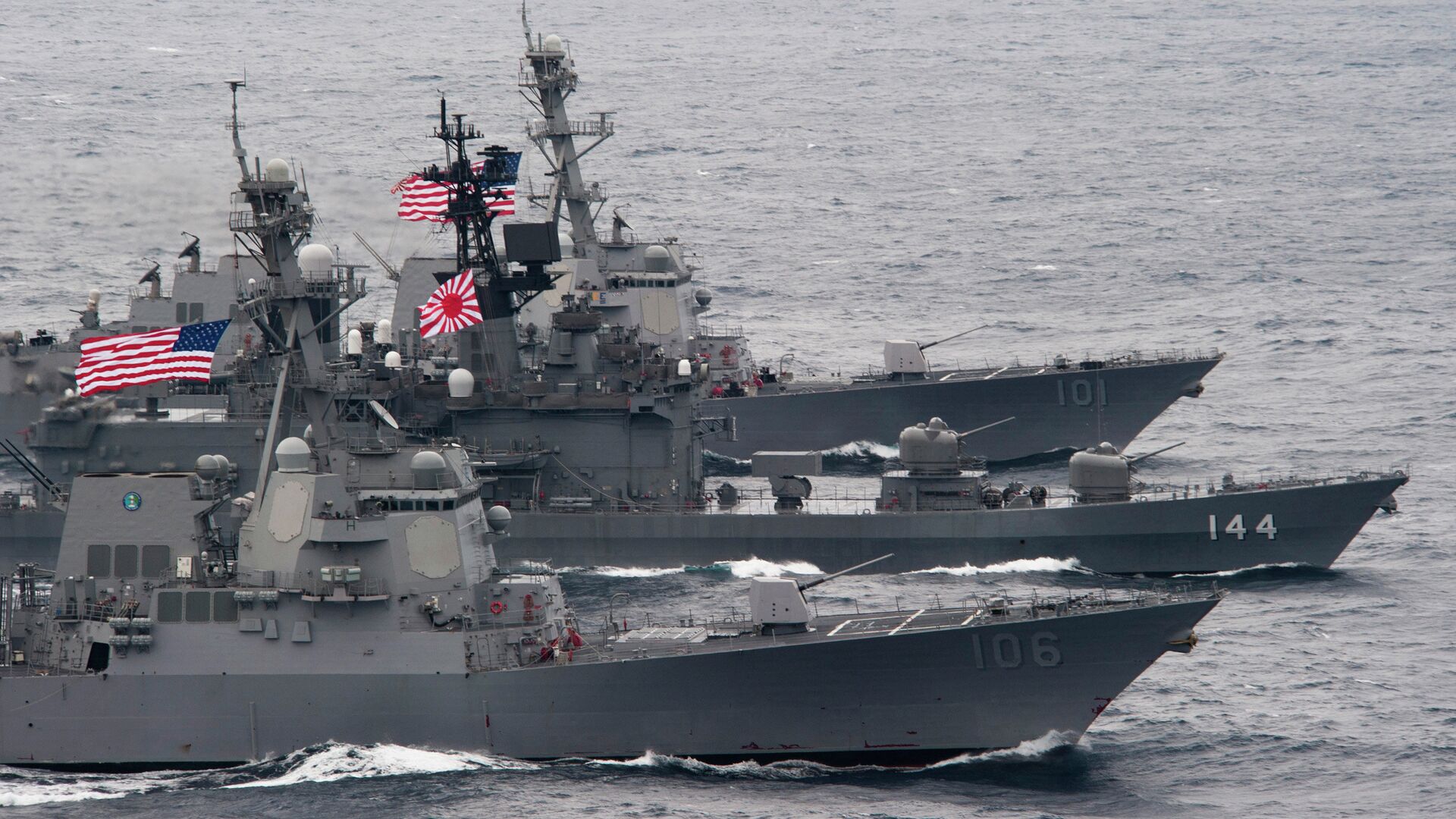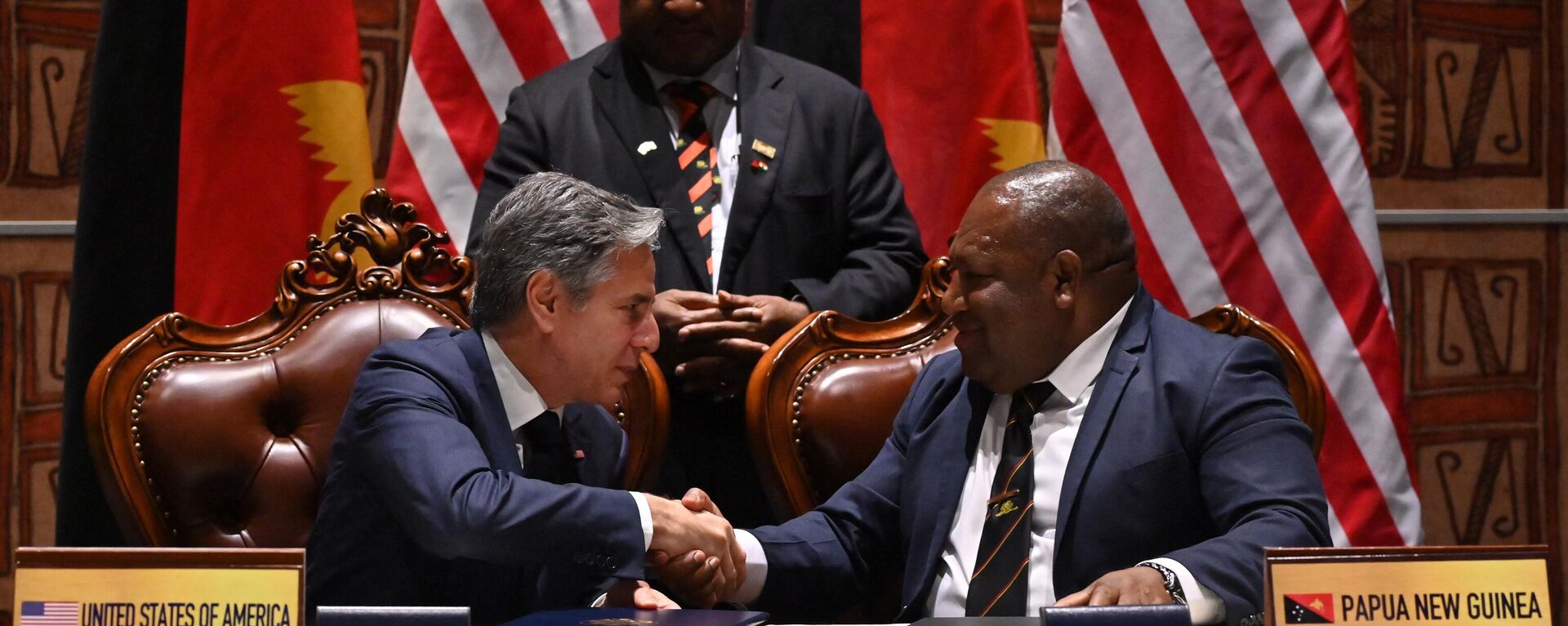https://sputnikglobe.com/20230607/power-has-shifted-dramatically-nato-expansion-plans-in-asia-bump-against-reality-1110988084.html
‘Power Has Shifted Dramatically’: NATO Expansion Plans in Asia Bump Against Reality
‘Power Has Shifted Dramatically’: NATO Expansion Plans in Asia Bump Against Reality
Sputnik International
The US is looking to expand NATO’s presence in the Asia-Pacific. Still, this ambitious plan is increasingly detached from geopolitical realities, said Sourabh Gupta, Resident Fellow at the Institute for China-America Studies.
2023-06-07T23:17+0000
2023-06-07T23:17+0000
2023-06-07T23:16+0000
china
japan
emmanuel macron
analysis
asia-pacific region
nato
asean
shinzo abe
pacific
us
https://cdn1.img.sputnikglobe.com/img/102125/01/1021250197_0:89:2701:1608_1920x0_80_0_0_2a8e386d1e5020011357f2e3e1767ac4.jpg
Discussions between NATO and Japan about opening a liaison office in Tokyo started in 2007, when former Japanese Prime Minister Shinzo Abe visited NATO's headquarters in Brussels; however, it was not until 2018 that Japan officially opened a branch in the capital city.France, a longtime member of NATO, has raised doubts about the idea, with French President Emmanuel Macron stating as recently as last week that the bloc should only operate within its present territory. At the time, Macron stated such a plan was an anomaly. Macron's opposition came on the heels of his visit to China two months ago, where he advised that Europe should not get involved in the US-China rivalry over Taiwan, as well as larger security affairs in the region. "If ... we push NATO to enlarge the spectrum and the geography, we will make a big mistake," Macron had said.However, Macron’s opposition is not the main hurdle in the latest effort to boost NATO's presence in Asia.Gupta has argued that Japan does not perceive itself as a regional power and detests coming to terms with it. Instead, Tokyo wants to exploit its ties with the West to stem its hysteria about China's economic and military might in East Asia, although contemporary history shows Beijing does not threaten Japan.Rather, Tokyo's activities in the region have left painful memories to both Chinese and Korean families.He also noted that the US was gradually losing its status as the hegemonic power in Asia, especially through China’s economic ties like the Belt and Road Initiative. Additionally, the trade volume between China and the Association of Southeast Asian Nations (ASEAN) was worth US $878.2 billion, making China ASEAN's largest trading partner for the second consecutive year with a 28.1% increase.In an attempt to clamp down on China's regional presence and compensate for its own declining influence, the US responded by turning to military means. In fact, during the first quarter of 2023, Washington proposed US $9.1 billion for military investments in the Asia-Pacific region as part of its Pacific Deterrence Initiative. The US also took the opportunity to open four new military bases in the Philippines and signed a defense and maritime surveillance pact with Papua New Guinea earlier this year."The United States has lost that part of the intellectual property that it owns in how to engender prosperity. Now it's about sanctions, tariffs, populism, and that sort of stuff. But on the security front, it shows that it can destroy anybody if it really wants to at any given point in time. But the fact of the matter is when you can just destroy things, but you cannot create things, you can't build things," Gupta concluded.
https://sputnikglobe.com/20230606/danish-pm-brushes-off-talk-of-nato-boss-ambitions-while-allies-gear-up-for-her-exit-1110939036.html
https://sputnikglobe.com/20230529/russia-warns-of-asia-pacific-militarization-after-us-papua-new-guinea-sign-defense-pact-1110782233.html
china
japan
pacific
Sputnik International
feedback@sputniknews.com
+74956456601
MIA „Rossiya Segodnya“
2023
Sputnik International
feedback@sputniknews.com
+74956456601
MIA „Rossiya Segodnya“
News
en_EN
Sputnik International
feedback@sputniknews.com
+74956456601
MIA „Rossiya Segodnya“
Sputnik International
feedback@sputniknews.com
+74956456601
MIA „Rossiya Segodnya“
nato is asia, china-japan relations, nato vs china, nato and japan, is japan in nato
nato is asia, china-japan relations, nato vs china, nato and japan, is japan in nato
‘Power Has Shifted Dramatically’: NATO Expansion Plans in Asia Bump Against Reality
Although the US is looking to expand NATO’s presence in the Asia-Pacific, this ambitious plan is growing increasingly detached from geopolitical realities, according to Sourabh Gupta, a resident fellow at the Institute for China-America Studies.
Discussions between NATO and Japan about opening a liaison office in Tokyo started in 2007, when former Japanese Prime Minister Shinzo Abe visited NATO's headquarters in Brussels; however, it was not until 2018 that Japan officially opened a branch in the capital city.
France, a longtime member of NATO, has raised doubts about the idea, with French President Emmanuel Macron stating as recently as last week that the bloc should only operate within its present territory. At the time, Macron stated such a plan was an anomaly.
Macron's opposition came on the heels of his visit to China two months ago, where he advised that Europe should not get involved in the US-China rivalry over Taiwan, as well as larger security affairs in the region.
"If ... we push NATO to enlarge the spectrum and the geography, we will make a big mistake," Macron had said. However, Macron’s opposition is not the main hurdle in the latest effort to boost NATO's presence in Asia.
Gupta has argued that Japan does not perceive itself as a regional power and detests coming to terms with it. Instead, Tokyo wants to exploit its ties with the West to stem its hysteria about China's economic and military might in East Asia, although contemporary history shows Beijing does not threaten Japan.
Rather, Tokyo's activities in the region have left painful memories to both Chinese and Korean families.
"The problem and Japan's - and has been the problem at the end - is that they have just created hysteria upon hysteria, upon hysteria regarding China as their end within themselves. And they've done this for the last 20 years, even when China was not a threat. What is happening out here is that power has shifted dramatically. I thought back in 2000, the Japanese economy [was] four times the size of a book, four or five times the size of the Chinese economy. Today, it is one-third the size of the Chinese economy," Gupta said.
He also noted that the US was gradually losing its status as the hegemonic power in Asia, especially through China’s economic ties like the
Belt and Road Initiative.
Additionally, the trade volume between China and the Association of Southeast Asian Nations (ASEAN) was worth US $878.2 billion, making China
ASEAN's largest trading partner for the second consecutive year with a 28.1% increase.
In an attempt to clamp down on China's regional presence and compensate for its own declining influence, the US responded by turning to military means. In fact, during the first quarter of 2023, Washington proposed US $9.1 billion for military investments in the Asia-Pacific region as part of its
Pacific Deterrence Initiative.
The US also took the opportunity to open four
new military bases in the Philippines and signed a defense and maritime surveillance pact with Papua New Guinea earlier this year.
"The United States has lost that part of the intellectual property that it owns in how to engender prosperity. Now it's about sanctions, tariffs, populism, and that sort of stuff. But on the security front, it shows that it can destroy anybody if it really wants to at any given point in time. But the fact of the matter is when you can just destroy things, but you cannot create things, you can't build things," Gupta concluded.




